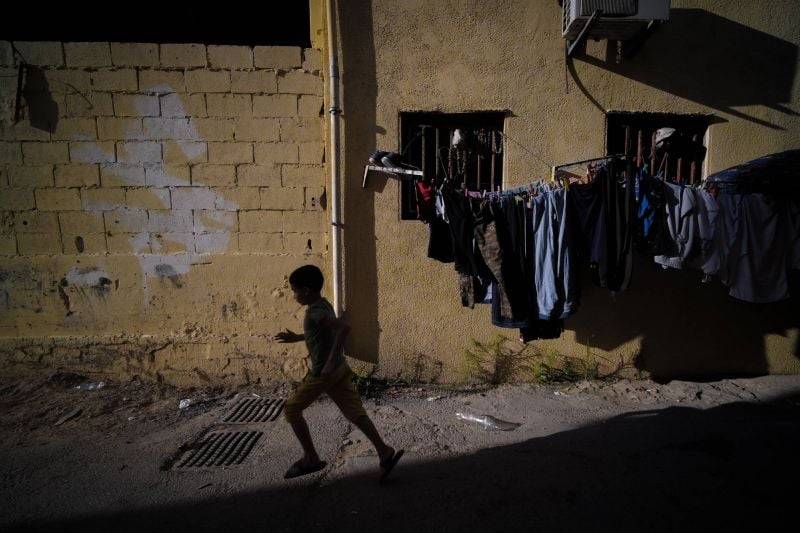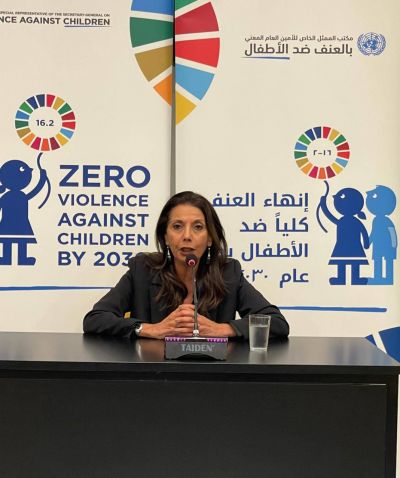
A child in Lebanon. (Credit: João Sousa/L'Orient Today/File photo)
BEIRUT — Lebanon has recently witnessed a "distressing" surge in various forms of child abuse and child abandonment, the administrator of United Nations Children's Fund (UNICEF) in Lebanon told L'Orient Today. The numbers are driven by the financial crisis' impact on families, Christophe Boulierac said, elaborating that the forms of child abuse on the rise include neglect, physical abuse and, notably, sexual abuse.
"The impact of the ongoing multi-layered crisis in Lebanon, compounded by educational and financial challenges, is undeniably a 'cost of inaction' scenario, resulting in severe consequences for caregivers, parents, and, most importantly, the well-being of children," Boulierac added, saying that the economic challenges have made it difficult for parents "to provide a nurturing and secure environment for their children."
Lebanon has been grappling with a severe economic crisis since 2019, drastically diminishing most citizens' purchasing power. The Lebanese lira has lost over 98 percent of its value.
The country has witnessed soaring inflation, making it increasingly challenging for people to afford basic necessities and essential goods, resulting in a sharp decline in living standards, profoundly impacting daily life.
UNICEF told L'Orient Today that its data clearly indicates a growing crisis for children in Lebanon.
Abandoned babies trend 'expected to increase'
Impoverished families have resorted to abandoning infants in the streets, while children face a higher risk of abduction, UNICEF told L'Orient Today, adding that the trend is "worrying" and "expected to increase in future."The state-run National News Agency reported on Aug. 2 that an abandoned infant girl was found near the village of Siblin in Mount Lebanon's Chouf region. The girl, whose age was not specified, was discovered in a pine forest along the old sea road, facing the Sindbad restaurant. The infant has been transferred to a hospital in the region, while the Saadiyat police station launched an investigation.
The Siblin incident is among at least four cases of child abandonment that L'Orient Today has reported on in less than a month.
An abandoned infant was found in a bag on a Tripoli street on July 18. One day later, two babies — aged three months and one year — were found abandoned in a box under a bridge near Nahr Ibrahim in the Jbeil area.
A baby boy, whose age is approximated to be on month, was found on the side of the road behind a gas station in Tripoli's Qobbeh neighborhood on July 24. A man said he discovered the child after hearing his cries.
According to UNICEF's 2021 report on children growing up in Lebanon's multifaceted crisis, the country already had one of the highest rates of child separation from their extended families, with an estimated 20,000 youngsters lodged in residential care.
"The harsh reality of the crisis is seen in parents' struggle to put food on the table due to widespread unemployment and soaring prices," Boulierac told L'Orient Today.
Lebanon has topped a 10-country list for year-on-year food-price inflation, reaching an alarming 261 percent, according to the World Bank Food Security Update released in April.
In UNICEF Lebanon’s most recent report, published in June, 90 percent of caregivers were short of money to purchase essentials, compared to 76 percent a year ago, while an overwhelming 75 percent of households had to rely on credit or loans to buy groceries or daily necessities.
Boulierac said neglect is also a grave concern in Lebanon.
"As parents and caregivers are overwhelmed by the challenging circumstances [they] are primarily focused on survival and providing for their families," he added. "As a result, many children are left without adequate care and supervision. Shockingly, about 1.8 million children are living in households where desperation prevails, [leaving parents] to resort to desperate measures, such as child labor or [child] marriage, to survive."
Asked about the legal steps that can be taken in Lebanon after finding an abandoned child, Boulierac said that "the child needs to be placed in an alternative care setting, which depends on a judicial decision prior to placement." Caregivers or caretakers who have abandoned children can be traced, he added, and face "legal ramifications [as] such abandonment [is] a criminal act."
Child abuse rates 'equally troubling'
"While the situation of child abandonment and institutionalization is alarming, the intensification of child abuse over the years is equally troubling," the UNICEF told L'Orient Today.
“Lebanon is facing significant challenges related to child abuse and abandonment, with distressing rates of child labor and corporal punishment,” Boulierac said. “Various forms of child abuse and gender-based violence are prevalent, and trends indicate an alarming increase in cases of sexual abuse and exploitation of children.”
UNICEF’s most recent report indicated that nine percent of households in Lebanon had children working.
Child labor is markedly higher in Syrian refugee households, compared to Lebanese households, with a seven percent increase over the past year, the UNICEF noted.
Meanwhile, reported cases of gender-based violence (GBV) against children increased by six percent compared to the previous year, according to data from the Gender-Based Violence Information Management System (GBVIMS).
"Among the reported GBV violations against children, forced marriage and psychological/emotional abuse were the most prevalent, accounting for 52 percent and 15 percent, respectively," Boulierac said. "Physical assault constituted 13 percent of the reported cases, while sexual assault made up 12 percent."
In early July, Lynn Taleb, a five-year-old Lebanese girl, died after repeated sexual assault. Taleb was found to be suffering from internal bleeding eight days after a stay with her mother at her grandfather's house in Miniyeh, northern Lebanon. Their stay coincided with the Eid al-Adha holiday, when the assaults are said to have occurred.
Two separate forensic reports confirmed that the child had been raped several times before her death. "Strong evidence" incriminating the uncle is being examined by the courts, a senior judicial source confirmed to L'Orient-Le Jour on Friday, explaining that the maternal family repeatedly refused to hospitalize the little girl in order to conceal the sexual assault that killed her.
"These distressing trends indicate a growing crisis in child protection and welfare in Lebanon," Boulierac said. "The adverse economic conditions, compounded by other social and political challenges, have exacerbated the vulnerability of children to abuse and neglect."
Prompt action is needed
UNICEF told L'Orient Today that some of the gaps in child protection in Lebanon which need urgent attention include providing "sufficient shelters and temporary care facilities for women and children who are victims of violence and abuse."
"Additionally, there is a need for solid and efficient referral pathways between various actors involved in child protection to ensure a seamless response to cases. A harmonized child helpline is also essential to provide centralized and accessible contact for children needing assistance and protection," UNICEF said.
In late July, the Village de paix et d'amour association, whose stated mission is to care for children in danger or abandoned by their parents in Lebanon, was closed after allegations arose of sexual abuse and other crimes by staff members.
Meanwhile, in mid-July, videos surfaced of an employee repeatedly striking children at the Garderêve day-care center in Jdeideh, Metn.
UNICEF told L'Orient Today that Lebanon's Health Ministry is in the process of developing a child-protection policy for all staff working in day care centers and nurseries.
UNICEF said it "acknowledges that the Lebanese government has taken steps towards building a comprehensive child protection system. In 2020, a national program of action for the protection of women and children was launched with UNICEF’s support, highlighting the government's commitment to addressing child protection issues."
"However, it is important to note that despite these initiatives, there are challenges hindering the full realization of a robust child protection system," it added. "Nationwide efforts must be made to strengthen social welfare programs, offer financial assistance to vulnerable families, and promote awareness campaigns focused on child protection and parenting support."


